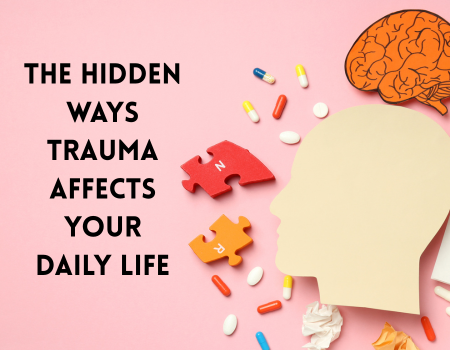Trauma isn’t always loud. It doesn’t always show up as obvious wounds or emotional outbursts. Sometimes, it hides in plain sight—woven quietly into your thoughts, behaviors, and daily routines. Whether it’s from a single life-altering event or a series of subtle, ongoing experiences, trauma has a way of lingering in your body and mind long after the event has passed.
The truth is, many people walk through life unaware that some of their struggles stem from unresolved trauma. Let’s explore some of the hidden ways trauma can affect your everyday life—and what you can do to start healing.
 1. You Overreact to Small Triggers
1. You Overreact to Small Triggers
Do you ever find yourself snapping over something minor? Or feeling overly anxious about a harmless situation? Trauma conditions your brain to remain on edge, constantly looking for threats even when you’re actually safe. Your nervous system can become so used to being in “fight, flight, or freeze” mode that it overreacts to everyday stressors.
What You Can Do:
Start paying attention to your body’s reactions. Grounding techniques like deep breathing, mindfulness, or placing your feet firmly on the floor can help calm your nervous system when you’re triggered. Therapy—especially trauma-informed approaches like EMDR or somatic therapy—can also help retrain your responses.
2. You Struggle With Boundaries
People who’ve experienced trauma, especially in relationships, often find it hard to say no or ask for what they need. This might come from a fear of rejection, abandonment, or not being “enough.” You may become a people-pleaser or avoid confrontation altogether to feel safe.
What You Can Do:
Practice setting small, safe boundaries first—like taking breaks when you’re overwhelmed or politely declining tasks you can’t handle. Remind yourself that your needs are valid and deserving of respect. Over time, boundary-setting becomes a form of healing.
3. You Constantly Feel Tired or Numb
Emotional trauma doesn’t only affect your thoughts—it’s stored deep within your body as well. You might feel emotionally drained, physically exhausted, or just disconnected from everything around you. This kind of fatigue isn’t just from a long day—it’s your body carrying unprocessed pain.
What You Can Do:
Make rest a priority, not a reward. Create time for joy, creativity, or gentle movement like yoga or walking. Reconnect with your body through activities that feel safe and nurturing. Working with a therapist can help you process the trauma instead of carrying its weight alone.
4. You Struggle With Self-Worth
Trauma—particularly during childhood—can deeply influence your sense of self and how you view your worth. If you were made to feel unloved, unsafe, or invisible, those messages can become your internal narrative. You might downplay your achievements, second-guess your decisions, or feel like you’re never “good enough.”
What You Can Do:
Challenge that voice in your head. Begin replacing harsh self-talk with affirmations grounded in truth. Keep company with those who recognize your value and consistently remind you of it. Writing in a journal or speaking with a trusted therapist can help bring those deep-rooted beliefs to light and reshape how you see them.
5. You Struggle With Trust and Intimacy
Whether it’s friendships, romantic relationships, or even trusting yourself—trauma can make it hard to feel safe with others. You may find yourself anticipating abandonment, betrayal, or rejection—even when there’s no actual danger. This can create distance and loneliness, even in the middle of relationships.
What You Can Do:
Start with self-trust. The more you learn to honor your instincts, listen to your needs, and give yourself compassion, the more your capacity for connection will grow. Healthy relationships also serve as healing spaces—don’t be afraid to seek them out, even slowly.
You don’t need to have everything figured out to begin healing from trauma. Recognizing how it subtly influences your life is the first brave step. Be patient with yourself. Healing isn’t linear—it’s layered, gentle, and deeply personal.
You are not broken. You’re adapting. And with time, support, and intentional care, you can unlearn survival patterns and step into a life that feels whole, empowered, and truly yours.
